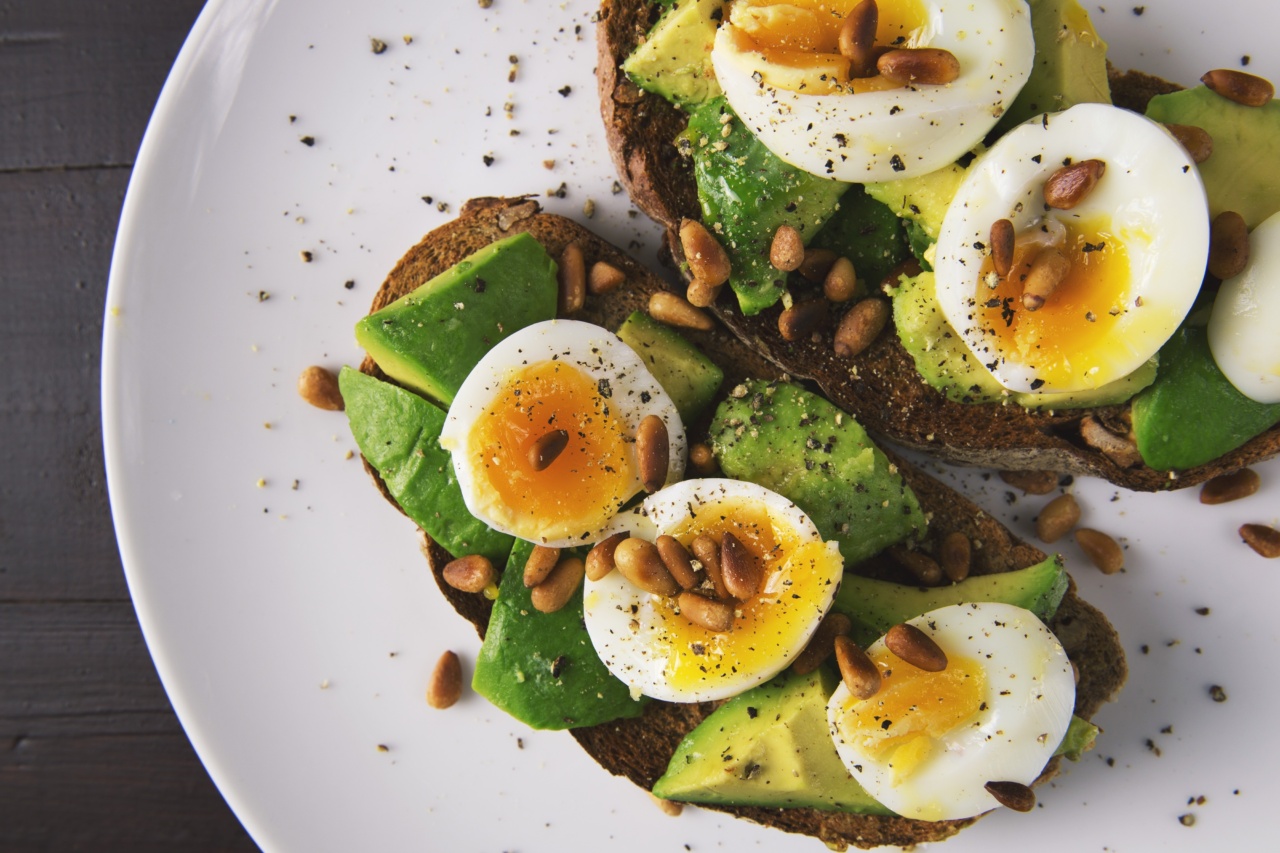Breakfast is often referred to as the most important meal of the day, and for good reason. It provides our body and brain with the necessary fuel and energy to kickstart our day.
After an overnight fast, our glucose levels are low, and breakfast helps replenish them, ensuring we have enough energy to focus and concentrate on our daily tasks.
The benefits of a healthy breakfast
1. Weight management: Research has shown that eating a healthy breakfast can aid in weight management. People who eat breakfast tend to have a lower body mass index (BMI) compared to those who skip this meal.
This may be because having breakfast can help regulate your appetite and prevent overeating later in the day.
2. Improved cognitive function: Breakfast provides our brain with the fuel it needs to function optimally.
Studies have suggested that eating a healthy breakfast can improve memory, attention, and problem-solving skills, making it easier to stay focused and productive throughout the day.
3. Enhanced mood: Starting your day with a nutritious meal can positively impact your mood. Breakfast provides important nutrients like vitamins, minerals, and antioxidants that promote the release of feel-good neurotransmitters, such as serotonin.
This can help boost your mood and overall mental well-being.
4. Increased nutrient intake: A well-rounded breakfast can provide essential nutrients that you may otherwise miss out on if you skip this meal.
Including a variety of foods, such as whole grains, fruits, vegetables, lean proteins, and healthy fats, can help ensure that you meet your daily nutrient requirements.
5. Lower risk of chronic diseases: Eating a healthy breakfast has been associated with a lower risk of chronic diseases, such as heart disease, type 2 diabetes, and obesity.
A balanced breakfast can help improve cholesterol levels, regulate blood sugar levels, and maintain a healthy weight, all of which are important factors in preventing these diseases.
What makes a healthy breakfast?
1. Balanced macronutrients: A healthy breakfast should include a balance of carbohydrates, proteins, and fats.
Carbohydrates provide the necessary energy, proteins help in muscle repair and growth, and fats aid in the absorption of fat-soluble vitamins and provide satiety.
2. Whole grains: Opting for whole grain cereals, bread, or oats can provide a good source of complex carbohydrates and fiber. These help keep you fuller for longer and prevent sudden spikes in blood sugar levels.
3. Fruits and vegetables: Including fruits and veggies in your breakfast can provide vitamins, minerals, and antioxidants. They add natural sweetness and contribute to your overall daily fiber intake.
4. Lean proteins: Adding lean sources of protein like eggs, Greek yogurt, or tofu can help keep you satisfied and provide essential amino acids necessary for various bodily functions.
5. Healthy fats: Incorporating healthy fats like avocado, nuts, or seeds into your breakfast can help boost satiety and provide a source of essential fatty acids.
Quick and healthy breakfast ideas
1. Overnight oats with berries and nuts: Prepare a jar of oats, milk (or non-dairy alternative), chia seeds, a touch of honey, and leave it in the fridge overnight. In the morning, top it with a handful of berries and some chopped nuts.
2. Veggie omelet with whole grain toast: Whisk together eggs or egg whites with your favorite vegetables like peppers, spinach, and mushrooms. Cook it in a non-stick pan and serve with a slice of whole grain toast.
3. Greek yogurt with fruits and granola: Choose a plain Greek yogurt and add your favorite fruits, such as berries or sliced banana. Sprinkle some granola or chopped nuts for crunch.
4. Avocado toast: Mash half an avocado and spread it on whole grain toast. Top it off with a sprinkle of salt, pepper, and a drizzle of olive oil.
5. Smoothie bowl: Blend a frozen banana, your choice of berries, a handful of spinach, and your preferred liquid (water, milk, or plant-based milk). Pour the smoothie into a bowl and add toppings like granola, coconut flakes, or chia seeds.
The importance of time management
Many people cite lack of time as the reason for skipping breakfast. However, with effective time management strategies, it is possible to make breakfast a priority.
1. Prepare in advance: Prepping ingredients or even complete breakfast meals the night before can save time in the morning. Whether it’s chopping fruits or pre-cooking oatmeal, having things ready to go can significantly reduce the morning rush.
2. Opt for quick and easy options: There are plenty of nutritious breakfast options that require minimal time and effort. Grab-and-go items like yogurt cups, protein bars, or pre-packaged smoothies can be picked up as you head out the door.
3. Set your alarm earlier: Waking up just a little earlier can provide you with extra time to make and enjoy a leisurely breakfast. It may take some adjustment, but the benefits of starting your day with a nutritious meal are worth it.
4. Take advantage of technology: Using kitchen gadgets like toasters or blenders can speed up the breakfast-making process.
Additionally, exploring quick and healthy breakfast recipes available online or through mobile apps can provide you with new ideas.
Breakfast for different dietary preferences
1. Vegetarian or vegan: Vegetarians and vegans can enjoy a variety of breakfast options. Plant-based proteins like tofu, tempeh, lentils, or chickpeas can be incorporated into dishes like scrambles, breakfast burritos, or smoothies.
Non-dairy milk alternatives, such as almond, soy, or coconut milk, can be used in cereals or coffee.
2. Gluten-free: For those following a gluten-free diet, options like gluten-free oats, quinoa, or rice-based cereals are available. Gluten-free bread or wraps can be used for making toast, sandwiches, or breakfast burritos.
3. Paleo: The paleo diet emphasizes whole, unprocessed foods, so a paleo breakfast might include eggs, bacon, vegetables, and fruits. Nut-based granolas and coconut flour pancakes are also popular choices.
4. Keto: A ketogenic breakfast typically consists of high-fat, low-carb options. These may include eggs, avocado, cheese, and low-carb vegetables like spinach or kale.
Bulletproof coffee, made with coffee, butter, and MCT oil, is another staple for keto enthusiasts.
The dangers of skipping breakfast
While it’s tempting to skip breakfast to save time or cut calories, there are potential negative consequences to consider.
1. Increased risk of overeating: Skipping breakfast can lead to excessive hunger later in the day, causing you to overeat or make unhealthy food choices. This can derail your overall efforts for a balanced diet.
2. Decreased energy levels: Without breakfast, you may experience decreased energy levels, making it harder to concentrate and perform daily tasks efficiently.
3. Nutrient deficiencies: By skipping breakfast, you may miss out on important nutrients that are often found in breakfast foods like fruits, vegetables, and whole grains.
4. Impaired mood and mental well-being: Skipping breakfast can negatively impact your mood, leaving you irritable, moody, and less motivated.
5. Disrupted metabolism: Regularly skipping breakfast can disrupt your metabolism, potentially leading to weight gain or difficulty in maintaining weight loss.
Conclusion
Breakfast truly is the most important meal of the day. It provides numerous benefits, such as weight management, improved cognitive function, enhanced mood, increased nutrient intake, and a lower risk of chronic diseases.
Remember to include a variety of nutrient-rich foods in your breakfast, such as whole grains, fruits, vegetables, lean proteins, and healthy fats. With effective time management strategies and a little planning, it’s possible to prioritize breakfast and reap the rewards of a healthy start to your day.































